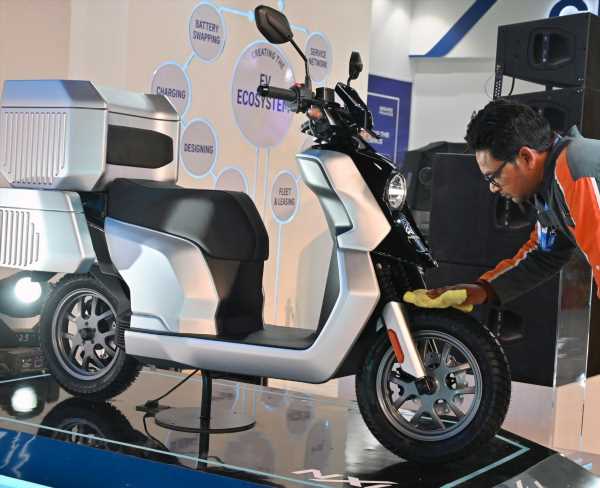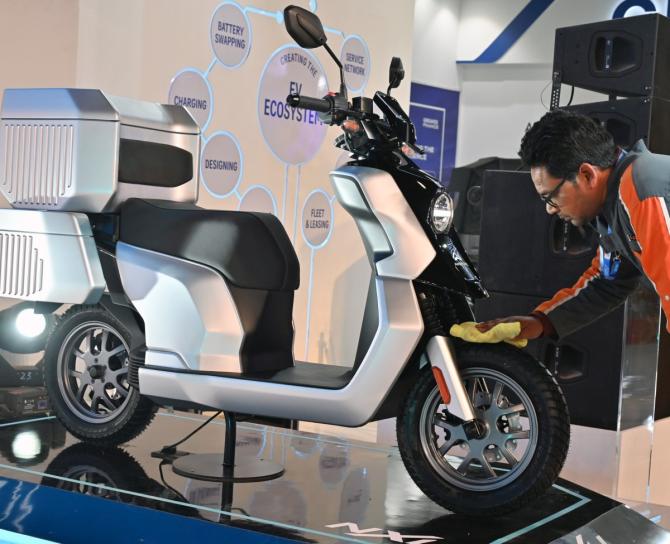Electric two-wheeler sales likely to breach 1 million mark in 2024
India’s electric two-wheeler (E2W) sector is expected to cross the one million mark in 2024 fuelled by rising demand, increased production, and affordability, industry experts said, even as several original equipment makers are expanding their penetration to rural areas.
Improved battery technology and innovative features are also likely to fuel growth, they said.
“E2W sales will breach the 1-million mark in 2024 as the demand for electric two-wheelers is expected to continue growing due to factors such as environmental awareness, government incentives, and improvements in technology,” Hyder Khan, chief executive officer (CEO), Godawari Electric Motors, said.
“Government support through incentives, subsidies, and favorable regulations are expected to play a crucial role in the growth of the electric two-wheeler market.
“Policy decisions could influence consumer choices and industry dynamics,” Khan said.
Godawari Electric Motors began its E2W journey in India in January this year, with the launch of Eblu Feo.
They plan to sell approximately 30,000 units in 2024.
Looking ahead to 2024, Ayush Lohia, CEO of Lohia Auto predicts a surge in sustainable mobility initiatives and government incentives driving E2W adoption.
“It is anticipated that an increased battery efficiency and energy density will extend the range of electric bikes.
“A growing emphasis on design innovation may lead to more aesthetically appealing and ergonomic electric two-wheelers, attracting a broader consumer base,” Lohia said.
“Manufacturers are expected to ramp up production, driven by advancements in battery technology and infrastructure development,” he said.
The consensus among industry peers is a forecast of robust growth in demand, production, and sales for E2Ws globally.
The global emphasis on sustainable transportation and government initiatives supporting electric mobility is expected to significantly boost consumer interest.
Manufacturers are gearing up to expand their product portfolios to cater to diverse consumer needs, with a focus on improving battery technology.
Shema Electric is an electric two-wheeler maker that launched two electric scooters (Eagle+ and TUFF+) this September and has so far approximately sold 10,000 units.
Yogesh Kumar Lath, founder and CEO of Shema Electric, emphasises the need for increased government support towards EV start-ups with long-term, sustainable policies.
“While larger businesses benefit from existing schemes, extending such support to smaller enterprises would further enhance the growth of India-manufactured electric two-wheelers.”
The positive outlook notwithstanding, challenges persist, with charging infrastructure, pricing, and evolving government policies remaining concerns for potential buyers.
Industry people are focusing on research and development for advanced batteries and exploring cost-effective initiatives.
Lath highlights a major challenge in the form of inconsistent government policies, making it difficult for manufacturers to adapt their products every 5-6 months.
“The lack of clarity regarding post-March 2024 policies adds ambiguity to production planning.
“Additionally, the unavailability of quality components and the absence of the latest technologies in India necessitate reliance on imported parts, posing cost challenges.
“Additionally, tier 2 and 3 cities still have inadequate charging infrastructure that impedes the seamless adoption of E2Ws,” he explained.
Joy e-bike’s spokesperson also anticipated challenges in 2024 which included battery constraints and affordability issues.
“We as an industry recognize these hurdles as catalysts for growth.
“Through continuous research and development for advanced batteries, cost-effective initiatives, and a focus on customer education and reliable service, the industry aims to positively influence its landscape.
“Diversifying supply chains remains integral to the industry’s strategy,” the spokesperson said.
Joy e-bike has more than 10 models in its portfolio in both high and low-speed categories, and it has established a presence in more than 55 cities across India.
Source: Read Full Article


